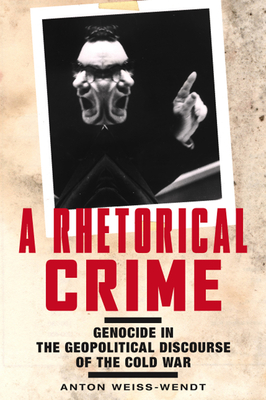

 Rutgers University Press
Rutgers University Press
A Rhetorical Crime: Genocide in the Geopolitical Discourse of the Cold War


Key Metrics
- Anton Weiss-Wendt
- Rutgers University Press
- Paperback
- 9780813594651
- 8.8 X 6.3 X 0.5 inches
- 0.8 pounds
- Law > Criminal Law - General
- English
 Secure Transaction
Secure TransactionBook Description
A Rhetorical Crime shows how genocide morphed from a legal concept into a political discourse used in propaganda battles between the United States and the Soviet Union. Over the course of the Cold War era, nearly eighty countries were accused of genocide, and yet there were few real-time interventions to stop the atrocities committed by genocidal regimes like the Cambodian Khmer Rouge.
Renowned genocide scholar Anton Weiss-Wendt employs a unique comparative approach, analyzing the statements of Soviet and American politicians, historians, and legal scholars in order to deduce why their moral posturing far exceeded their humanitarian action.
Author Bio
Mr. Anton Weiss-Wendt received an M.A. in modern Jewish history at New York University and a B.A. in modern European history at the University of Tartu, Estonia. During his fellowship at the Museum, he was a Ph.D. candidate at Brandeis University.
Anton Weiss-Wendt is a Norwegian academic and historian
For his Charles H. Revson Foundation Fellowship for Archival Research, Mr. Weiss-Wendt conducted research for his project “The Holocaust in Estonia: The Problem of Indigenous Collaboration.”
Mr. Weiss-Wendt has published several articles in scholarly journals including, “Extermination of the Gypsies in Estonia during World War II” in Holocaust and Genocide Studies (Spring 2003); “What We Make out of the Holocaust: American and Estonia Compared,” in Vikerkaar (Spring 2001); and “The Soviet Occupation of Estonia in 1940-1941 and the Jews,” in Holocaust and Genocide Studies (Fall 1998).
He has presented his research at major international scholarly conferences.
In 1999, he spoke on Estonian collaboration at the United States Holocaust Memorial Museum’s symposium, Perspectives on Indigenous Collaboration in the Baltic States during the German Occupation. He has worked for the Robert Wagner Labor Archives at New York University, the Andrei Sakharov Archives at Brandeis, and the U.S. Department of Justice’s Office of Special Investigations.
He is the recipient of numerous awards including Dorot and Fulbright Fellowships as well as grants from the Soros Foundation, Max Kade Foundation, and German-American Exchange Program (DAAD).
Source: Holocaust Memorial Museum
Videos
No Videos
Community reviews
Write a ReviewNo Community reviews